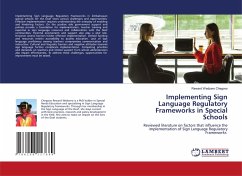Implementing Sign Language Regulatory Frameworks in Zimbabwean special schools for the Deaf faces various challenges and opportunities. Effective implementation requires understanding the interplay of enabling and hindering factors. On the positive side government support and policies provide a foundation for implementation, teacher training and expertise in sign language resources and collaboration with the Deaf communities. Parental involvement and support also play a vital role. However several barriers hinder effective implementation. Limited funding and resources restrict accessibility to quality education. Lack of sign language proficiency among teachers compromises communication and instruction. Cultural and linguistic barriers and negative attitudes towards sign language further complicate implementation. Competing priorities and demands on teachers and limited support from school administrators also impact effectiveness. To address these challenges, opportunities for improvement must be seized.
Bitte wählen Sie Ihr Anliegen aus.
Rechnungen
Retourenschein anfordern
Bestellstatus
Storno


